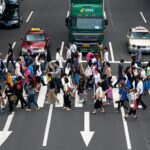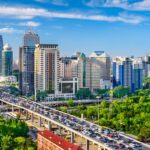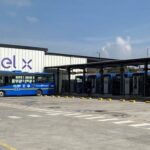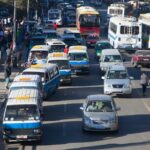
Abating China’s transport sector greenhouse gas emissions, which accounted for about 11% of the world’s transport emissions in 2018, is key to meeting both national and global climate goals. In 2021, China updated its Nationally Determined Contributions (NDCs), outlining ambitious ...


The world’s ability to overcome the climate change challenge hinges, in part, on what happens on China’s roads. China’s cars, buses, trucks, shipping and other transport generated 828 million tonnes of greenhouse gases in 2014. That’s almost the equivalent of the EU ...


To achieve more equitable, resilient, low-carbon societies, cities need big changes to critical infrastructure and systems. But ample research shows they can’t raise the investment needed for those big changes on their own. Municipalities depend on higher levels of government ...


Cities are increasingly trying to discern what post-pandemic resilience will look like, especially in terms of mobility and public transport. And in Colombia, cities are known for their innovations in public transport systems — like Bogotá’s bus rapid transport and ...


As our colleagues have covered previously, there are clear health and environmental benefits to adopting electric school buses instead of their diesel counterparts, which account for more than 90% of the U.S. school bus fleet and result in harmful exhaust ...


Electric vehicles (EVs) are on the rise in the United States. The Biden administration aims for 50% of new light-duty vehicle sales to be zero-emission by 2030. Some states have even more ambitious targets, like California, Massachusetts and New York, which plan to reach 100% new ...


In 2015, the chairman of a Kampala administrative zone about 10 kilometers (6 miles) from the city’s downtown addressed a hand-written note to the chairman of a minibus taxi association. He humbly requested the group of drivers expand its services ...


The Infrastructure Investment and Jobs Act, also known as the Bipartisan Infrastructure Law, offers U.S. states and cities the chance to invest in transportation systems that modernize infrastructure, expand access and mobility for all people in a community, improve public ...


The Intergovernmental Panel on Climate Change (IPCC), composed of hundreds of the world’s leading scientists, puts considerable weight on urban climate action in developing pathways towards sustainable futures. The 6th Assessment Report of the IPCC recognizes that urban areas present ...


The Digital Transport for Africa (DT4A) initiative, led by WRI and partners and funded by the French Development Agency (AFD), has selected four winners of the first-ever DT4A Innovation Challenge. From private companies to universities and NGOs, these initiatives are helping to shift ...

Page 18 of 341« First...10...171819...3040...Last »